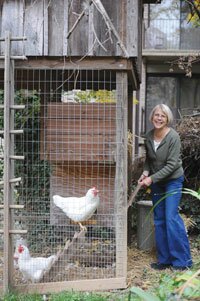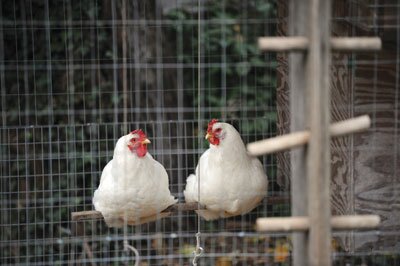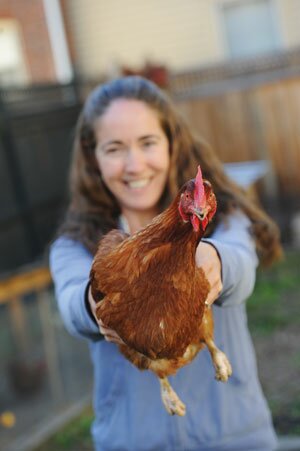 Alice Gore's two white Orpingtons share a roost.
Alice Gore's two white Orpingtons share a roost.
PHOTOS BY JEN FARIELLO
In 1966, Chickenman, a radio short that satirized the television series "Batman" was created by Dick Orkin at WCFL-AM in Chicago. The introduction was "Chickenman, he's everywhere, he's everywhere." Chickenman is no more, but city chickens are proliferating.
I know of four coops within two blocks of my downtown home, as well as ducks and chickens in the Woolen Mills, and two coops off of Locust Avenue. Recently, the checkout clerk at the Southern States farm co-op noted that chicken feed was flying out of the store. The Charlottesville League of Chicken Keepers (CLUCK) has an interactive map (http://www.communitywalk.com/chickens) showing the location of some of its members' coups.
Why the renewed interest? Some say chicken-raisers are inspired by the Slow Food and Locavore movements. Others like the idea of introducing their children to the mechanics and reality of food production.
Perhaps the gnarly economy is pushing it.
"At some point, our food system is going to have a very rude awakening," said Guinevere Higgins back in March. The leader of CLUCK, the Charlottesville League of Urban Chicken Keepers as well as co-founder of Blue Ridge Backyard Harvest, a company helping people farm their yards, Higgins contends that a spike in gas prices, a big outbreak of food-borne illness, or a massive recall may shock the nation. "And those best positioned to weather those upsets," said Higgins, "will be home gardeners."
Alice Gore (full disclosure, she is my wife) has been raising chickens in our downtown backyard since 2003. She started with two refugees from a 4-H project, Araucana crosses, which laid green eggs. "Why chickens?" I asked her.
"I was at a friend's house, and heard this soothing sound in the back yard," she answered. "I was told it was the neighbor's happy chickens. I wanted that sound in my back yard."
So it can just be plain fun.
How about the legalities of chickens in the city? Do you tell the neighbors that you are really raising "feathered Shih Tzus"? I reviewed the City of Charlottesville Code of Ordinances. The city is quite specific about certain agricultural animals:
"Sec. 4-9. Keeping hogs, goats and sheep.
(a) No hogs or sheep shall be kept in the city except for immediate shipment or slaughter.
(b) No goats shall be kept within the city." -- recently repealed
It certainly prohibits you from letting your livestock run amuck:
"Sec. 4-7. Livestock at large.
No person shall permit a horse, mule, cow, bull, sheep or hog to run at large in the city."
The only place poultry are regulated is:
"Sec. 4-8. Fowl at large.
It shall be unlawful for any person to permit any chickens, ducks, geese, pigeons or other fowl belonging to him to go at large in the city; except, that homing pigeons may be released for return to their cote without violating this section."
So the keeping of chickens and even cattle are not regulated at all. Might we next be seeing miniature milk cows tethered to toney downtown lawns? Or Llamas?
If the chickens can not go at large, how are they housed? My wife started with a chicken tractor. This is a cage on wheels with no bottom. It allows you to move the chickens from one feeding area to another. However, we learned that chickens were voracious grazers, and our little lawn was soon getting denuded. We remodeled our children's play house into a breezy coop.
Lisa & Jason Colton of North First Street decided to build a coop with three neighbors. In order to not run afoul of the historic preservation law, they had to submit plans for their palais de poulet to the Charlottesville Board of Architectural Review. The BAR pronounced it a beautiful design, and unanimously gave its approval in February 17.
During that same meeting we learned that urban chickens have not so much arrived, as they are back. Mary Gilliam of South Street noted that most of the properties in the neighborhood had had chicken coops as outbuildings.
So now that you have a coop, where to get chickens? Tractor Supply has chicks every spring. These are inexpensive; but they have not been sexed, so you will get roosters along with your hens. This is problematic, as the roosters will not provide eggs, and though there is no ordinance prohibiting them, common courtesy suggests avoiding them, as your neighbors may not appreciate that morning wakeup crow. But wait, don't you need the roosters to help make eggs?
If you hadn't slept through your biology class, you might not still be wondering whether the chicken or the egg came first, or how one gets eggs without roosters. You males might recall that your female companions ovulate about every 28 days whether you are around to encourage them or not. Depending on the season, it's the same with chickens, except they ovulate about every 23 hours.
So you probably want just hens.
I have a friend of Asian extraction, who when I first met him, described his father's occupation as being "in the poultry business." It wasn't until I got to know him well, that he finally admitted that his father was a chicken sexer.
It turns out that determining the sex of baby chicks is very difficult. Until 1933, it was pure guesswork. That year, a paper was published in Japan by Professors Masui and Hashimoto, describing a method of determining the sex of chicks. Soon the Japanese dominated the field. It became an important occupation for Japanese who immigrated to the United States.
We decided we didn't want to raise chicks, so we purchased young hens from Eden Farms, a small, family-run pet ranch located 20 minutes west of Richmond in Goochland County. Jack Agnew, the father of the industrious young people running the place comments, "This is a 4-H project that got out of control."
We came for buff Orpingtons, but chose two white Orpingtons. Why Orpingtons? Because we like saying the word.
How many eggs can you get? The Seattle Tilth website notes that one can expect standard laying breeds to produce 180-320 eggs per year. So two chickens equals two eggs a day, regular as cluckwork.
It may not sound like much, but soon you are searching for egg recipes. I recommend that you try Fannie Farmer's basic four-egg cheese soufflé, but make it with five eggs. Serve this elegant appearing dish with fresh crusty bread and a salad. Your guests are always impressed, as soufflés have a reputation for being difficult and falling. Not with this recipe (see below).
When they are no longer spring chickens, our non-laying girls become what my wife calls "pensioners." Again the Seattle Tilth: "At about three or four years, production is not very efficient. Most commercial and farm hens are culled after their second season of laying." My brother-in-law has become proficient in slaughtering his pensioners. We chicken out and make them pets.
As pets, chickens can be disappointing. You might recall Tom Smothers, of the Smothers Brothers comedy team. He complained that all he had for a pet was a "crummy chicken." The tough old birds can be hard boiled or broody, or even try to include you in their pecking order. Nonetheless, they inspire affection and devotion from their keepers.
In June, a tree limb fell and struck one of Higgins' city chickens, lacerating its head and neck. A doctor at Monticello Animal Hospital sutured the wounds; and while Higgins notes the visit was not cheap, she is pleased to report a full recovery of her beloved bird's brain.
Fellow chicken-raisers Will and Lisa Richey experienced something even worse. In late August, all 27 of their chickens fell victim to a neighbor's dog that slipped inside the coop in the dark of night. Now they're trying again--- this time with the aid of a livestock guardian dog, a Great Pyrenees.
What is on the horizon for Charlottesville and the growing urban agriculture movement? We could be seeing more goats, as City Council voted in September to repeal the City's ban on urban goatkeeping.
Belmont denizen Meghan Keith-Hynes, as the head of the "Charlottesville Goat Justice League" spearheaded that move as a logical extension of the urban gardening movement.
Keith-Hynes' group did some research that found the ban originated with a July, 1975 letter to City Council from someone unhappy about a goat in their neighborhood and asking for a committee to prohibit farm animals from the city.
The goat ban took effect in 1976. Already, there are worries of noise and smell, but if urban goats turn out as well as urban chickens, then Charlottesville may soon become known for its agricultural animals. And-- at least with chickens-- for a soothing sound coming from urban backyards.

Alice Gore is not the only chicken farmer on downtown's Altamont Street.

Guinevere Higgins likes urban farming so much she co-founded a firm that helps people grow their own.
PHOTOS BY JEN FARIELLO
#